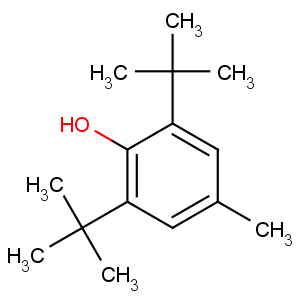Title: Butylated Hydroxytoluene
CAS Registry Number: 128-37-0
CAS Name: 2,6-Bis(1,1-dimethylethyl)-4-methylphenol
Synonyms: 2,6-di-
tert-butyl-
p-cresol; 2,6-di-
tert-butyl-4-methylphenol; BHT
Trademarks: Antrancine 8 (Jandekker); Tenox BHT (Eastman Kodak); Ionol CP (Shell); Sustane (UOP); Dalpac; Impruvol; Vianol
Molecular Formula: C15H24O
Molecular Weight: 220.35
Percent Composition: C 81.76%, H 10.98%, O 7.26%
Literature References: Prepn from
p-cresol and isobutylene: Stillson,
US 2428745 (1947 to Gulf); McConnell, Davis,
US 3082258 (1963 to Eastman Kodak). Toxicity study: W. A. McOmie
et al., J. Am. Pharm. Assoc. 38, 366 (1949). Review of physicochemical properties, antioxidant activity and toxicology: H. Babich,
Environ. Res. 29, 1-29 (1982); of antimicrobial activity: M. Raccach,
J. Food Saf. 6, 141-170 (1984); of safety assessment as food additive: G. M. Williams
et al.,
Food Chem. Toxicol. 37, 1027-1038 (1999).
Properties: Crystals, mp 70°. d420 1.048. bp 265°. Flash pt (open cup): 260°F (127°C). Insol in water. Freely sol in toluene, sol in methanol, ethanol, isopropanol, methyl ethyl ketone, acetone, Cellosolve, petr ether, benzene, most other hydrocarbon solvents. Soly in liquid petrolatum (white oil): 0.5% w/w. More sol in food oils and fats than butylated hydroxyanisole. Good soly in linseed oil. LD50 orally in mice: 1040 mg/kg (McOmie).
Melting point: mp 70°
Boiling point: bp 265°
Flash point: Flash pt (open cup): 260°F (127°C)
Density: d420 1.048
Toxicity data: LD50 orally in mice: 1040 mg/kg (McOmie)
CAUTION: Potential symptoms of overexposure are irritation of eyes and skin.
See NIOSH Pocket Guide to Chemical Hazards (DHHS/NIOSH 97-140, 1997) p 124.
Use: Antioxidant for food, animal feed, petroleum products, synthetic rubbers, plastics, animal and vegetable oils, soaps. Antiskinning agent in paints and inks.

